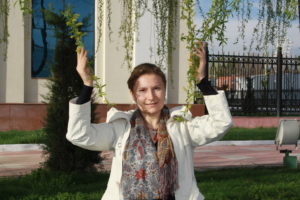Я, Елена Муратова, родом из маленького города Газалкент, Узбекистан. Литературовед по образованию, изучала русский язык и литературу в Узбекском государственном университете мировых языков. Увлекалась изучением английского языка с детства, выполняла переводы научных монографий. Литературный перевод выполняю впервые, потому что захотелось попробовать свои силы в чем-то большем, чем просто чтение любимых книг в оригинале.
Counrty : Uzbekistan
Перевод произведения Алины Чопчик «Изгои»
Outcasts
I was happy before the war though had not known that. We have had family dinners and cleaning days, holidays and ordinary week days, extraordinary week days when I could not sleep at nights full of overwhelming emotions and memories. We have had plans, hopes and certainty of tomorrow. We visited grandmother in Damascus every summer, visited our acquaintances and participated in city hurly-burly. Insensibly for ourselves and our parents we grew up knowing no real sorrows and not knowing what lies ahead. The war seemed to be something remote, existing only in books and in running news lines.
Our family, like thousands of other families, lived in customary world, peacefully and humbly, committing no serious faults that would deserve punishment. Sometimes I have angrily thought that decisions of others should not affect the lives of millions. Someone coveted blood and money and realization of mercenary purposes which caused children suffer and die. Children are pure, therefore Allah takes them first.
Realization of what was happening did not come immediately. Like a snow slide the war only began to be in full swing, flaring up and fading away in one area, then in another. Armed men appeared on the streets, attacking and killing, like raids of barbarians on Rome. It seemed nothing serious happening, but Rome fell by the barbarians and Aleppo was destined to repeat Rome’s fate.
Initially I did not care about conflicts, having heard only endless conversations and arguments about it unwittingly replaced all the usual subjects. Our neighbor used to drop in more and more frequently, and he and our father used to sit down in the hall speaking and talking about rebels, revolution and sieges of cities. Mother ordered us not to interfere and was leaving room herself, letting the men talk.
At first we felt discomforted when father forbade Effa, my sister, to ride on a bicycle in the evenings, and me to go to the market alone. He knew how I liked to go there alone, and that Effa, who were repeating this ritual for years, could not sleep without having a ride, and yet he forbade it all. And we dared no contradicting him.
The war came unnoticed as thief comes to someone’s house and all of a sudden the life changed its usual course. In the morning, awakened by intensifying noise of helicopters which caused anxiety and discomfort, like sudden nail scratch on white board, I suddenly realized that from now on it will only get worse.
I went to the window and pulling curtains aside saw black and thick smoke rising and swirling around somewhere in distance, while helicopter was flying around till it moved off like a wasp which was driven away.
«Are we going to die?» Jundub, my five-year-old brother, was sitting cringed on his bed and looking at me and Iffa with his big, frightened eyes, ready to burst into tears any moment. I approached him, and he immediately snuggled in my arms.
«Maybe,” Iffa said to herself, but I catch it. Afraid that Jundub might have also heard her, I looked angrily at my sister.
«Do not look at me like that» said Effa calmly, looking out of window again. Now I could not see her face from behind the curtains.
«Last three nights I keep on having еру same dream» said Effa after a while. «I see myself standing on the roof top of the building and looking at ruins. I do not recognize Aleppo in the ruins, but somehow I know that these are remains of our city. » Effa sighed sadly.
“I look at city wreckage and turn around for sudden clicks of cameras. There is crowd of Europeans behind. They look at what was left of Aleppo, photographing, filming, outraged and weeping, shaking their heads sympathetically. But the moment I step forward to them, the barbed wire fence appears from somewhere. I grab its sharp edges, sobbing for help.” — Effa grinned, considered how stupid and useless this now, in reality.
«And this faceless crowd is looking at me with pity and yet continue watching my desperate attempts to get to other side of the fence” Effa continued with dislike for these heroes of her dream. She looked at her hands, as if expecting to see wounds caused by barbed wire.
“Waking up today, I thought that from now on nothing will be like before. And we will never ever again, Janan, never – she hesitated as going to cry — We’ll never be that happy as we were before”.
Effa shivered and wrapped her arms around herself. Jundub ran to hug her.
She lowered her head, looking puzzled at brother’s head, pressed against her waist.
«Dad will protect us,» muttered Jundub. «He will save us.»
Effa smiled to me. I smiled back in silence.
Unceasing shooting, so deafening and frightening at first, in due course became hardly noticed background. Soon the whole family began to watch the news and father was getting more serious and strict, food became scanty and there could be no question of extra expenses. Low-voiced conversations behind the door now forced me and Effa to listen intensely, as if our future was depending on these conversations.
A tank passed by the house once and this clanking metal sound of its spinning caterpillar tracks aroused such horror in me that I froze, sensing icy breath of death. I suddenly realized that death lived outside the door; that it was real, tangible and possible to invoke. And yet I still did not know what war was.
Now it is hard to convey in words what I was feeling while passing by ruined buildings and riddled walls, feeling cracks of broken glass under the feet and panting from ubiquitous dust. Here and there laid turned out cobblestones and clothes and things that turned into nothing, wires and iron pieces sticking out from everywhere, wheels, broken ladders and broken lives. Seeing how war destroys your homeland is like seeing your child getting worse while you cannot help him, cannot order sickness to leave, and all you have to do is to watch how he dies, praying for his salvation.
Probably, that’s why my mother began to pray more frequently and harder than usual. She prayed frenziedly, suffocating, raising the voice overfilled with emotions and lowering it to a barely audible whisper, with hands shaking, and voice trembling like stretched string ready to burst.
It was going worse. There were tanks firing at houses and blowing up buildings, hospitals and schools. There were rebels conducting terrorist attacks and endless fighting which was destroying everything around, destroying the whole history of our country and the soul of our city. Impoverished, we weakened in constant fear. Like beggars, we were queuing for bread, water and other supplies. And yet I still were not understanding what war was …




 (12 оценок, среднее: 4,33 из 5)
(12 оценок, среднее: 4,33 из 5)